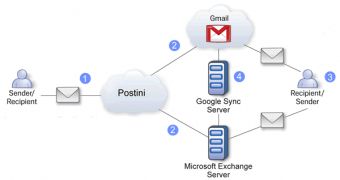Google was built by giving stuff away and making money from the advertising, but the company has been increasingly interested in the enterprise market recently. The latest move is a sly one, Google is now offering a cloud back-up system for Microsoft Exchange based on Gmail and other Google products.
Essentially all email is synced between Exchange and Gmail and, if the Microsoft solution becomes unavailable for whatever reason, users can simply switch to Gmail and continue work.
This is also true for calendar and contacts data. Dubbed Google Message Continuity, it's a product of the Postini acquisition from 2007.
"Google Message Continuity is a cloud-based email continuity solution—a service that helps to ensure that you always have access to your email," Rajen Sheth, Group Product Manager for Google Apps, wrote.
"Google Message Continuity works by replicating email accounts hosted on Microsoft Exchange Servers in the cloud, using Gmail, Calendar and Contacts," he said.
"If the Microsoft Exchange Server fails, or requires scheduled maintenance or downtime, all you have to do is log into Gmail and continue regular, up-to-date email communication through Google," he added.
"Since Gmail and Microsoft Exchange are constantly synchronized with each other, you can seamlessly switch from one email environment to the other," he explained.
Google Message Continuity is available for $25 per user per year or for $13 per user per year if your organization is already using Postini. Message Continuity works with Exchange 2003 and Exchange 2007 for now.
The tool could prove useful in a number of cases, but it could come in handy for more than just making sure the email system is always working. Google points out the obvious fact that Message Continuity is a great tool for companies contemplating a migration to Google Apps.
Having the system work alongside existing products means that users can get accustomed to Gmail and the rest of the suite without too much disruption. It also means that, if the company does decide to migrate, all of the email data is already in the Google cloud.

 14 DAY TRIAL //
14 DAY TRIAL //